A person retiring from the Drinagh Co-op board asked Marguerite Crowley if she would consider putting her name forward for a seat. Caroline O’Donovan and Caroline O’Neill had a similar route to the boards of Barryroe Co-op and Lisavaird Co-op respectively. All three got onto the board unopposed. Vanessa Kiely O’Connor was successful in an election before taking her place on the board of Bandon Co-op.
However, there was a stumbling block to be overcome before Marguerite Crowley could put her name forward. Co-op rules at the time meant that only the primary shareholder could sit on the board.
“I was delighted to be asked but then a simple thing; the farm and everything is in joint names but for the board, it’s the lead shareholder only and the shares were in the name of Michael and Marguerite. We had to have it approved at a board meeting that my name would go ahead of Michael’s. He agreed and it was approved at the December meeting. The election wasn’t until April so the board knew I was going to go for it then.”
When it comes to the role of a director, Vanessa Kiely O’Connor said the legacy of previous boards shows the impact they can have – those who had one eye on the future for the wider west Cork community.
“What we have today is due to other people’s passion and foresight. Seeing what happened with the RTÉ board and how questions weren’t asked highlighted how important a board member’s role is,” she said. Caroline O’Neill said that joining a board comes with a massive responsibility.
“It’s not a social thing.
You can choose to sit back but if you choose to do that, where is the change going to come from? “The board has taken way more of my time than I expected. But if you’re passionate about it, it will take up your time,” she said.
Activities
The activities of each of the boards have evolved over the years, encompassing other subsidiary businesses. They’re no longer confined to dairy processing activities. Because of this, she felt board members aren’t remunerated enough for what they do.
“You’re doing so much lobbying. Or the two-hour meeting that goes to four hours or when farmers that call to your door with their problems they want raised at the next meeting. That’s all your time. Anybody else doing that in a co-op is on a wage,” she said.

Caroline O'Donovan, Ballinspittle, Co Cork. Barryroe Co-op board member.
The perception among some farmers is that all board members do is have a two-hour monthly meeting to set milk prices.
That might be an outsider’s view but on taking her seat on the board of Barryroe Co-op in June 2023, Caroline O’Donovan learned swiftly there’s much more involved. “It was straight into derogation and the rally in Bandon. The whole year has been non-stop about it. Our chair Peter Fleming and vice-chair John O’Brien drove it.
“We were constantly bringing politicians down to the Timoleague catchment to show what Teagasc were doing compared to what the Environmental Protection Agency (EPA) were and showing the difference it would make to a family farm if it had to go to 250kgN/ha to 220kgN/ha or 170kgN/ha.”
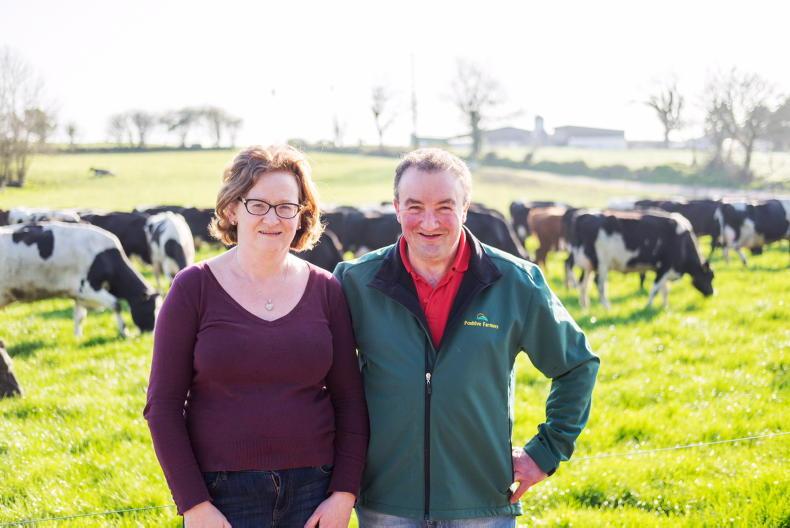
Marguerite Crowley with her husband Michael
“You’d wonder were you brought in as the token woman but you want to be treated in your own right,” said Marguerite Crowley.
“Maybe I was asked to consider going on the Drinagh board to tick a box for female inclusion, but I feel that I have all the necessary qualifications. I’ve almost 30 years farming, had a business course done at third level, and recently completed my diploma in corporate direction.
“I feel that this kind of course should eventually become mandatory for board members, I couldn’t recommend it enough.”
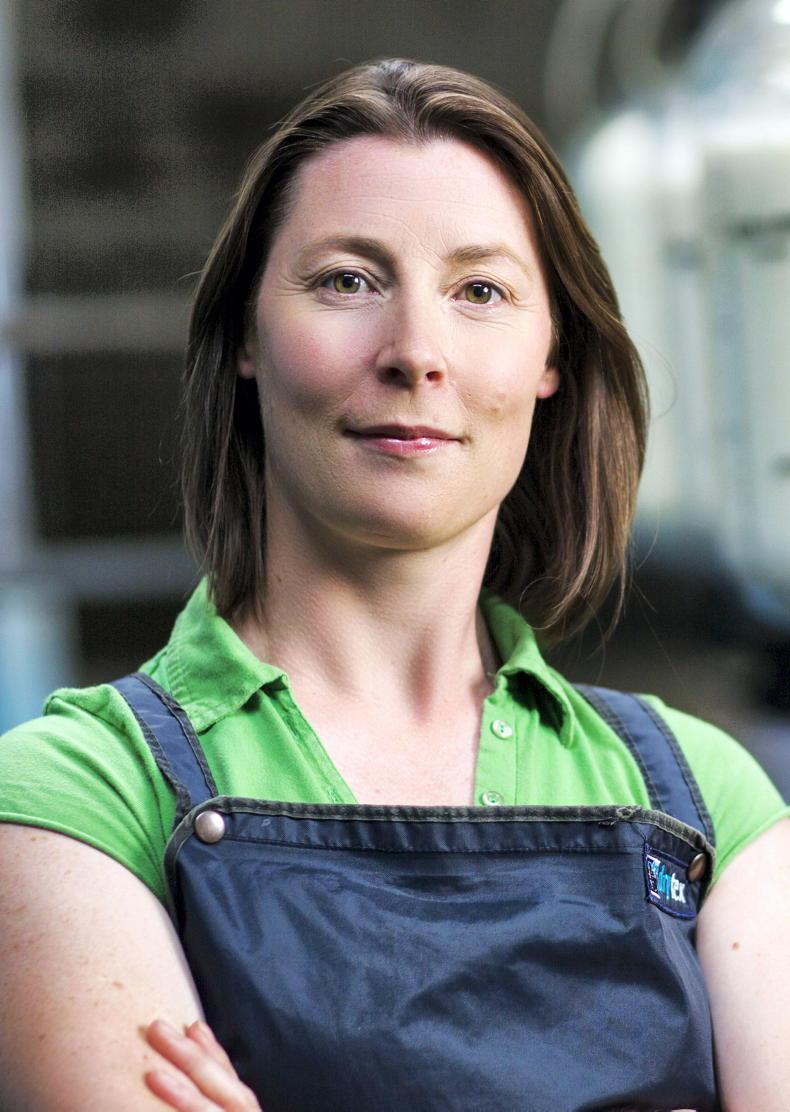
Vanessa Kiely O’Connor
Kiely O’Connor agrees with her. She completed the same course and found it beneficial. It eliminated much of what could be an apprenticeship as new members get a handle on the activities of the board.
“I felt when I did that course it brought you up to speed on what the business requires and how you understand your senior managers and your business rather than all the co-op bits we already know. Like how things are analysed. What are the key questions for the benefit of shareholders and of the business? Coming from a farming background I found it very beneficial.”
Being the only woman on the board doesn’t bother them. At most agricultural events there is a higher proportion of men compared to women.
As O’Donovan said: “When you’re a woman who’s farming, people tend to know you before you know them.”
“I don’t feel treated any differently to anyone else there,” said Crowley. “I feel my contributions at meetings are received well, and I feel respected and deserving of my seat. Every board member has different talents, and we all work together very well.
“I think women bring different qualities to meetings, I think we have greater empathy than men, and I feel that we multi-task well in general. I’m a great listener, which is important, and I think I’m growing in confidence with every meeting.
“I think with time and experience, either us ladies or our female successors will get the chance to progress, and maybe chair one of our co-ops, and maybe before too long, it would be great to then see a female chairperson of Carbery Group.”
Morale and generational renewal
Vanessa Kiely O’Connor said she had been at a number of conferences recently where people have asked what can be done to motivate farmers to implement more environmentally beneficial changes.
Motivation isn’t the issue, she felt, rather lack of acknowledgement followed by demands to do more.
“Morale is low and they’re not getting recognition for doing the right thing. When a farmer is doing all these things and they’re not hearing about it in the media then it’s not motivating them to continue.”
The portrayal of farmers in the climate debate is also a factor in low morale in the sector.
There appears to be a narrative that solving the climate issue is the sole preserve of farmers.
Listening to the radio every morning while milking, Caroline O’Donovan said that anytime there is a news piece about farming it’s that they need to be doing more.
When you’re a woman who’s farming, people tend to know you before you know them.” I don’t feel treated any differently
“We’re being painted as the villains in the environment thing. There doesn’t seem to be recognition for what farmers are doing. Every time it’s ‘farmers must do more and do it now’.
“We hear this is what will save the planet but it sounds different for people in other sectors like transport, energy or people who go on how many flights a year, they’re grand if the farmers might cop themselves on,” O’Donovan added.
“What’s frustrating with that too is we invested and put in solar panels on our farm but the emissions credit will go to the energy sector, not agriculture.
“It’s been a tough year too, everything is just standing still. This is the time of year where usually all the main bills are paid and farmers are able to build up cash reserves but because of the year we’ve had so far that’s not happening now. It’s the same with silage,” she said.

Caroline O' Neill / Donal O' Leary
“Farmers are tired,” added Caroline O’Neill. “The anticipation for change and hunger to survive isn’t the same anymore especially for anyone older. It’s a hard one.” The milk supply isn’t future-proofed anymore, according to her.
“A farmer could go and buy land but if they have to put in any infrastructure and go borrowing, nitrates is the biggest problem, the uncertainty of it.
“If you are buying or leasing ground now to future proof you need to buy or lease at a lot bigger scale because you don’t know what stocking rate to plan for. That uncertainty is after driving the price of leasing ground mad anyway and it will impact on generational renewal.”
Like the derogation, she feels that is something the industry was slow to take note of.
“It had to hit the pocket of the industry before they saw it whereas as farmers we could see it a mile off.
“Farmers put bread and butter on a lot of tables, people need to start realising that before producers stop producing.”
Part of the solution to ensuring the future of milk supply could happen internally within co-op areas, said Marguerite Crowley.
“The co-op knows there’s this good young farmer that wants to milk cows and they know about the farmers who want to retire so, it’s about trying to match them up.
“Otherwise, these farms will be rewilded or sold to someone else outside farming. It sounds a bit funny but it’s a bit like Tinder for farming. West Cork will always have farming families. It’s just getting harder and harder and we have to think differently.
“I didn’t know anything about farming until after we got married, but found that I loved it, and wouldn’t change it now for anything.”
Kiely O’Connor didn’t grow up on a farm and came to west Cork as a farm apprentice.
“I milked my first cow at 18 or 19. When I started, the only chance for me to farm in my own right was to go to France, that was the only place where there were farm partnerships and that would have been my only chance to farm in my own right.
“Young farmers bring so much energy, they take on board all the new criteria farmers need and they don’t see it as the obstacle compared to someone who’s been asked to change after farming a certain way all their life.
“Bringing youth in gets over that challenge.”
A person retiring from the Drinagh Co-op board asked Marguerite Crowley if she would consider putting her name forward for a seat. Caroline O’Donovan and Caroline O’Neill had a similar route to the boards of Barryroe Co-op and Lisavaird Co-op respectively. All three got onto the board unopposed. Vanessa Kiely O’Connor was successful in an election before taking her place on the board of Bandon Co-op.
However, there was a stumbling block to be overcome before Marguerite Crowley could put her name forward. Co-op rules at the time meant that only the primary shareholder could sit on the board.
“I was delighted to be asked but then a simple thing; the farm and everything is in joint names but for the board, it’s the lead shareholder only and the shares were in the name of Michael and Marguerite. We had to have it approved at a board meeting that my name would go ahead of Michael’s. He agreed and it was approved at the December meeting. The election wasn’t until April so the board knew I was going to go for it then.”
When it comes to the role of a director, Vanessa Kiely O’Connor said the legacy of previous boards shows the impact they can have – those who had one eye on the future for the wider west Cork community.
“What we have today is due to other people’s passion and foresight. Seeing what happened with the RTÉ board and how questions weren’t asked highlighted how important a board member’s role is,” she said. Caroline O’Neill said that joining a board comes with a massive responsibility.
“It’s not a social thing.
You can choose to sit back but if you choose to do that, where is the change going to come from? “The board has taken way more of my time than I expected. But if you’re passionate about it, it will take up your time,” she said.
Activities
The activities of each of the boards have evolved over the years, encompassing other subsidiary businesses. They’re no longer confined to dairy processing activities. Because of this, she felt board members aren’t remunerated enough for what they do.
“You’re doing so much lobbying. Or the two-hour meeting that goes to four hours or when farmers that call to your door with their problems they want raised at the next meeting. That’s all your time. Anybody else doing that in a co-op is on a wage,” she said.

Caroline O'Donovan, Ballinspittle, Co Cork. Barryroe Co-op board member.
The perception among some farmers is that all board members do is have a two-hour monthly meeting to set milk prices.
That might be an outsider’s view but on taking her seat on the board of Barryroe Co-op in June 2023, Caroline O’Donovan learned swiftly there’s much more involved. “It was straight into derogation and the rally in Bandon. The whole year has been non-stop about it. Our chair Peter Fleming and vice-chair John O’Brien drove it.
“We were constantly bringing politicians down to the Timoleague catchment to show what Teagasc were doing compared to what the Environmental Protection Agency (EPA) were and showing the difference it would make to a family farm if it had to go to 250kgN/ha to 220kgN/ha or 170kgN/ha.”

Marguerite Crowley with her husband Michael
“You’d wonder were you brought in as the token woman but you want to be treated in your own right,” said Marguerite Crowley.
“Maybe I was asked to consider going on the Drinagh board to tick a box for female inclusion, but I feel that I have all the necessary qualifications. I’ve almost 30 years farming, had a business course done at third level, and recently completed my diploma in corporate direction.
“I feel that this kind of course should eventually become mandatory for board members, I couldn’t recommend it enough.”

Vanessa Kiely O’Connor
Kiely O’Connor agrees with her. She completed the same course and found it beneficial. It eliminated much of what could be an apprenticeship as new members get a handle on the activities of the board.
“I felt when I did that course it brought you up to speed on what the business requires and how you understand your senior managers and your business rather than all the co-op bits we already know. Like how things are analysed. What are the key questions for the benefit of shareholders and of the business? Coming from a farming background I found it very beneficial.”
Being the only woman on the board doesn’t bother them. At most agricultural events there is a higher proportion of men compared to women.
As O’Donovan said: “When you’re a woman who’s farming, people tend to know you before you know them.”
“I don’t feel treated any differently to anyone else there,” said Crowley. “I feel my contributions at meetings are received well, and I feel respected and deserving of my seat. Every board member has different talents, and we all work together very well.
“I think women bring different qualities to meetings, I think we have greater empathy than men, and I feel that we multi-task well in general. I’m a great listener, which is important, and I think I’m growing in confidence with every meeting.
“I think with time and experience, either us ladies or our female successors will get the chance to progress, and maybe chair one of our co-ops, and maybe before too long, it would be great to then see a female chairperson of Carbery Group.”
Morale and generational renewal
Vanessa Kiely O’Connor said she had been at a number of conferences recently where people have asked what can be done to motivate farmers to implement more environmentally beneficial changes.
Motivation isn’t the issue, she felt, rather lack of acknowledgement followed by demands to do more.
“Morale is low and they’re not getting recognition for doing the right thing. When a farmer is doing all these things and they’re not hearing about it in the media then it’s not motivating them to continue.”
The portrayal of farmers in the climate debate is also a factor in low morale in the sector.
There appears to be a narrative that solving the climate issue is the sole preserve of farmers.
Listening to the radio every morning while milking, Caroline O’Donovan said that anytime there is a news piece about farming it’s that they need to be doing more.
When you’re a woman who’s farming, people tend to know you before you know them.” I don’t feel treated any differently
“We’re being painted as the villains in the environment thing. There doesn’t seem to be recognition for what farmers are doing. Every time it’s ‘farmers must do more and do it now’.
“We hear this is what will save the planet but it sounds different for people in other sectors like transport, energy or people who go on how many flights a year, they’re grand if the farmers might cop themselves on,” O’Donovan added.
“What’s frustrating with that too is we invested and put in solar panels on our farm but the emissions credit will go to the energy sector, not agriculture.
“It’s been a tough year too, everything is just standing still. This is the time of year where usually all the main bills are paid and farmers are able to build up cash reserves but because of the year we’ve had so far that’s not happening now. It’s the same with silage,” she said.

Caroline O' Neill / Donal O' Leary
“Farmers are tired,” added Caroline O’Neill. “The anticipation for change and hunger to survive isn’t the same anymore especially for anyone older. It’s a hard one.” The milk supply isn’t future-proofed anymore, according to her.
“A farmer could go and buy land but if they have to put in any infrastructure and go borrowing, nitrates is the biggest problem, the uncertainty of it.
“If you are buying or leasing ground now to future proof you need to buy or lease at a lot bigger scale because you don’t know what stocking rate to plan for. That uncertainty is after driving the price of leasing ground mad anyway and it will impact on generational renewal.”
Like the derogation, she feels that is something the industry was slow to take note of.
“It had to hit the pocket of the industry before they saw it whereas as farmers we could see it a mile off.
“Farmers put bread and butter on a lot of tables, people need to start realising that before producers stop producing.”
Part of the solution to ensuring the future of milk supply could happen internally within co-op areas, said Marguerite Crowley.
“The co-op knows there’s this good young farmer that wants to milk cows and they know about the farmers who want to retire so, it’s about trying to match them up.
“Otherwise, these farms will be rewilded or sold to someone else outside farming. It sounds a bit funny but it’s a bit like Tinder for farming. West Cork will always have farming families. It’s just getting harder and harder and we have to think differently.
“I didn’t know anything about farming until after we got married, but found that I loved it, and wouldn’t change it now for anything.”
Kiely O’Connor didn’t grow up on a farm and came to west Cork as a farm apprentice.
“I milked my first cow at 18 or 19. When I started, the only chance for me to farm in my own right was to go to France, that was the only place where there were farm partnerships and that would have been my only chance to farm in my own right.
“Young farmers bring so much energy, they take on board all the new criteria farmers need and they don’t see it as the obstacle compared to someone who’s been asked to change after farming a certain way all their life.
“Bringing youth in gets over that challenge.”









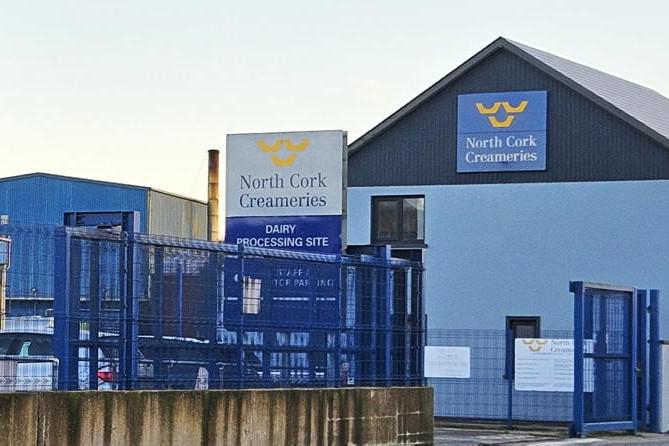

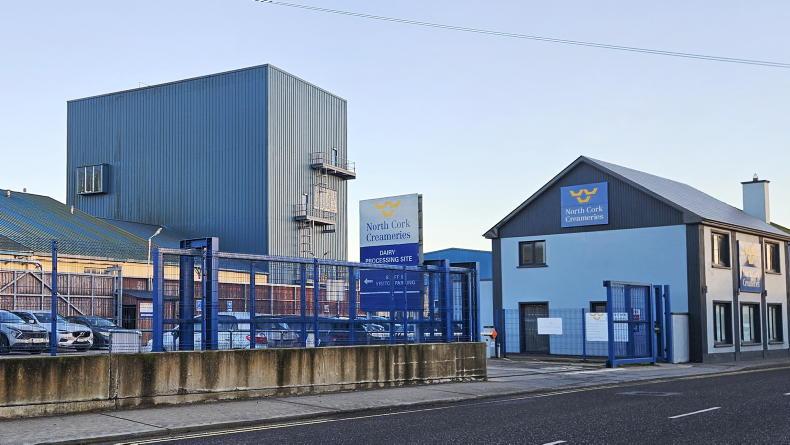
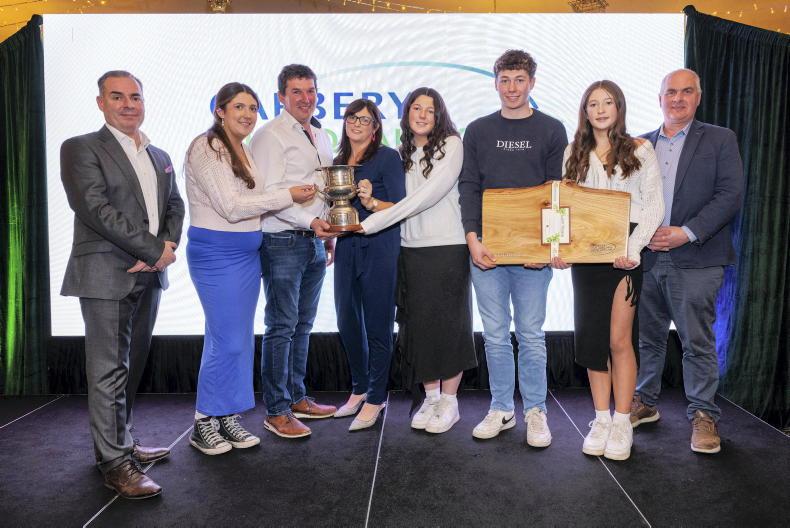
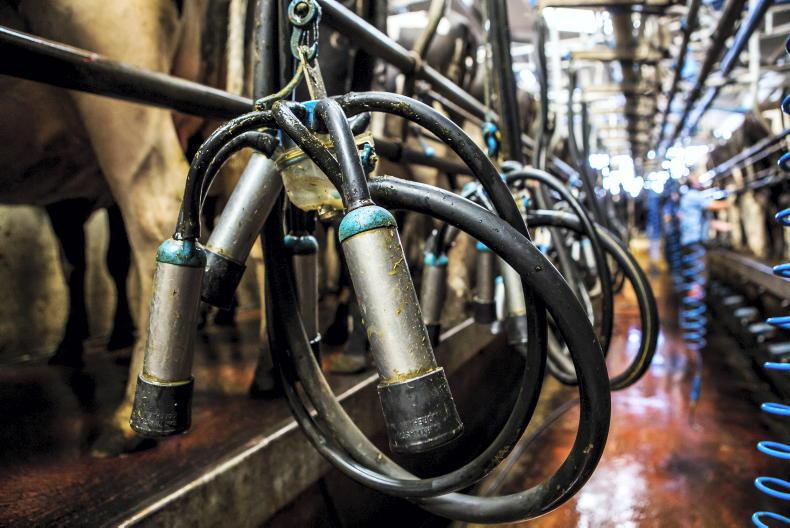
SHARING OPTIONS